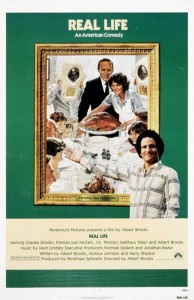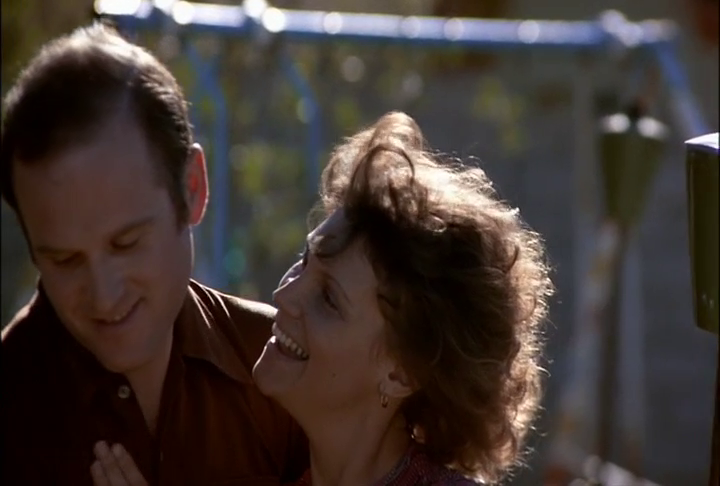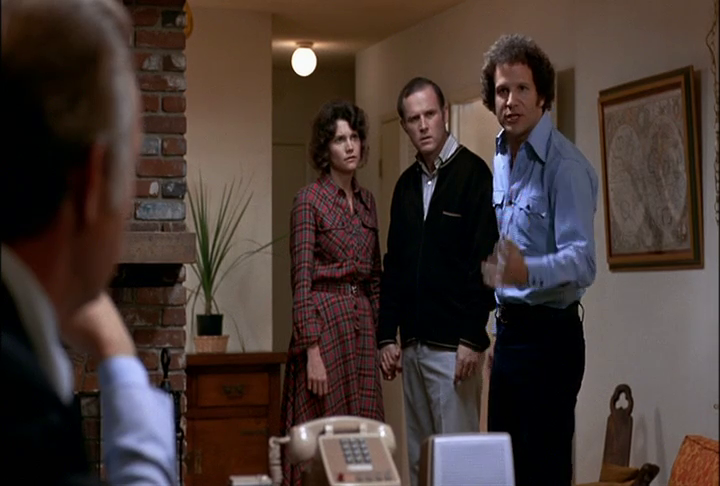|

Synopsis:
A pushy film director (Albert Brooks) recruits an “ordinary” American family — Charles Grodin, Frances Lee McCain, Lisa Urette, and Robert Stirrat — to open up their house to a documentary crew and two psychologists (Matthew Tobin and J.A. Preston).
|
|
Genres, Themes, Actors, and Directors:
- Albert Brooks Films
- Directors
- Mockumentaries
- Family Problems
Response to Peary’s Review:
Peary writes that this “reasonably funny satire” — which “pokes fun at PBS’s American Family series that presented the lives of the Louds in cinema verite style — shows that “the presence of a camera alters reality” and “asserts that documentarians have a lot of gall to take their cameras into people’s homes to exploit them”. Given that reality television is now beyond de rigeur (and few younger viewers will have seen the original series), director-star Albert Brooks’ satirical insights no longer pack the same punch; 21st century audiences understand how “reality” is inevitably obscured by being filmed, and (thanks to ample mass media coverage) have a more nuanced view of what it means for participants to be “exploited” while simultaneously exploiting the genre for their own fame and gain. With that said, as Peary notes, the movie “has peculiar insight into family life, some believable characterizations, and several truly hilarious scenes”, including Brooks singing “to Phoenix residents about how he ‘sincerely’ appreciates them; the visit to McCain’s crooked gynecologist; and Grodin’s showing incompetence while operating on a horse”. (I also enjoy the slow-mo montage sequence.)
However, things get off to a creaky start as soon as filming begins in the Yeagers’ house, as we’re shown how the Yeagers’ “normal” appearance during the audition process masked (who knew?!) a darker suburban reality of bitchy wives, petulant children, and put-upon, milquetoast husbands. McCain’s immediate crush on Brooks — while strategically fueling the ego of his “opportunist” character “whose integrity and sensitivity come and go” — feels patently false, and the two kids are instantly forgettable. Although Peary argues that the secondary plotline involving “Brooks’s meetings with psychologists and studio executives” causes the film to lose momentum, I disagree; I actually find Brooks’ character (as obnoxious as he is) the most perversely interesting and authentic in the film, and his dealings with a faceless producer ring all-too-true. The film’s denouement is reasonably inspired, and zany enough to leave us feeling that this film is really about outsized Hollywood egos run amok.
Redeeming Qualities and Moments:
- Some amusing moments

- Brooks’ no-holds-barred performance as (a variation on) himself

Must See?
No, though you’ll certainly want to check it out if you’re an Albert Brooks fan.
(Listed in 1001 Movies You Must See Before You Die)
Links:
|



One thought on “Real Life (1979)”
First viewing – not must-see.
The points laid out in the assessment are all well-stated and I agree with a good many of them. But I didn’t find anything (outside of the gynecologist scene, frankly) even mildly amusing. To me, the film has a marked feeling of desperation about it…one that is totally removed from the desperate feeling written into the script.
I was basically bored.
As an 18-year-old, I saw the PBS program about the Loud family and was riveted by every episode. I may have been the only one in my family who was interested in it (or even aware of what the program actually was). It’s true that knowledge of that program isn’t necessary to ‘appreciate’ Brooks’ film – but his film kind of recalled for me how genuinely groundbreaking ‘An American Family’ was.